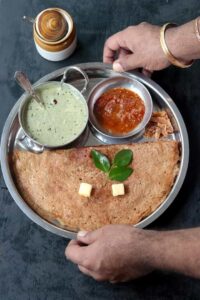Sports Nutrition
What is Sports Nutrition
Sports nutrition is the foundation of athletic success. It is a well-designed nutrition plan that allows active adults and athletes to perform at their best.
It supplies the right food type, energy, nutrients, and fluids to keep the body well hydrated and functioning at peak levels. A sports nutrition diet may vary day to day, depending on specific energy demands. That’s exactly why you need a sports nutritionist. They tailor diets to individual athletes, considering their training regimen, goals, and dietary preferences. They optimize nutrient intake to enhance performance, aid recovery, and prevent injuries. These professionals ensure the right balance of carbohydrates, proteins, fats, vitamins, and minerals, enabling athletes to excel consistently.
Need to consult?
Why is Sports Nutrition Necessary
Active adults and competitive athletes turn to sports nutrition to help them achieve their goals. Examples of individual goals could include gaining lean mass, improving body composition, or enhancing athletic performance. These sport-specific scenarios require different nutritional programs. Research findings indicate the right food type, caloric intake, nutrient timing, fluids, and supplementation are essential and specific to each individual.
The following are different states of training and competitive sport benefiting from sports nutrition.
Eating for Exercise/Athletic Performance
Training programs require a well-designed sports diet for active adults and competitive athletes. Research shows a balanced nutrition plan should include sufficient calories and healthy macronutrients to optimize athletic performance. The body will use carbohydrates or fats as the main energy source, depending on exercise intensity and duration. Inadequate caloric intake can impede athletic training and performance.
Active adults exercising three to four times weekly can usually meet nutritional needs through a normal healthy diet. Moderate to elite athletes performing intense training five to six times weekly will require significantly more nutrients to support energy demands. You should always get in touch with a certified sports nutritionist and bodybuilding dietitians near me to know your nutritional requirements.
For example, and according to research, energy expenditure for extreme cyclists competing in the Tour de France is approximately 12,000 calories per day.
- Carbohydrates are the main fuel source for an active adult or competitive athlete. General guidelines for carbohydrate intake are based on body size and training characteristics. Carbohydrate needs in a daily diet can range from 45 to 65% of total food intake depending on physical demands.
- Proteins are responsible for muscle growth and recovery in the active adult or athlete. Sufficient amounts of protein per individual help maintain a positive nitrogen balance in the body, which is vital to muscle tissue.
- Protein requirements can vary significantly ranging from .8g to 2g per kilogram of body weight per day.
- Fats help maintain energy balance, regulate hormones, and restore muscle tissue. Omega-3 and omega-6 are essential fatty acids that are especially important to a sports nutrition diet. Research findings recommend an athlete consume approximately 30% of their total daily caloric intake as a healthy fat.
Eating for Endurance
Endurance programs are defined as one to three hours per day of moderate to high-intensity exercise. High-energy intake in the form of carbohydrates is essential. According to research, target carbohydrate consumption for endurance athletes ranges from 6g to 10g per kilogram of body weight per day. Fat is a secondary source of energy used during long-duration training sessions. Endurance athletes are more at risk for dehydration. Replacing fluids and electrolytes lost through sweat are necessary for peak performance.
Eating for Strength
Resistance training programs are designed to gradually build the strength of skeletal muscle. Strength training is high-intensity work. It requires sufficient amounts of all macronutrients for muscle development. Protein intake is especially vital to increase and maintain lean body mass. Research indicates protein requirements can vary from 1.2g to 3.1g per kilogram of body weight per day.
Eating for Competition
Preparing for a competitive sport will vary in sports nutrition requirements. For example, strength athletes strive to increase lean mass and body size for their sport. Endurance runners focus on reduced body weight/fat for peak body function during their event. Athletic goals will determine the best sports nutrition strategy. Pre and post-workout meal planning are unique for each athlete and essential for optimal performance.
Hydration and Sports Performance
Adequate hydration and electrolytes are essential for health and athletic performance. We all lose water throughout the day, but active adults and athletes lose additional body water (and a significant amount of sodium) sweating during intense workouts. Dehydration is the process of losing body water, and fluid deficits greater than 2 percent of body weight can compromise the athletic performance and cognitive function. Athletes are recommended to use fluid replacement strategies as part of their sports nutrition to maintain optimal body functioning.
Rehydration with water and sports drinks containing sodium are often consumed depending on the athlete and sporting event. Lack of sufficient hydration for athletes may lead to the following:
- Hypohydration (dehydration).
- Hypovolemia (decreased plasma/blood volume).
- Hyponatremia (low blood sodium levels/water intoxication).
Supplements in Sports Nutrition
Sports supplements and foods are unregulated products marketed to enhance athletic performance. According to the Academy of Sports Medicine, “the ethical use of sports supplements is a personal choice and remains controversial.”
There are limited supplements backed by clinical research. The Australian Institute of Sport has provided a general guide ranking sports performance supplements and foods according to the significance of scientific evidence
- Sports food: sports drinks, bars, and gels, electrolyte supplements, protein supplements, liquid meal supplements.
- Medical supplements: iron, calcium, vitamin D, multi-vitamin/mineral, omega-3 fatty acids.
- Performance supplements: creatine, caffeine, sodium bicarbonate, beta-alanine, nitrate.
Special Circumstances
Sports nutrition covers a wide spectrum of needs for athletes. Certain populations and environments require additional guidelines and information to enhance athletic performance. The clinical nutrition specialist at Food and Wellness works closely with athletes to address specialized requirements. They factor in variables like altitude, climate, and specific sport demands to create personalized plans.
Vegetarian Athlete
A vegetarian diet contains high intakes of plant proteins, fruits, vegetables, whole grains, and nuts. It can be nutritionally adequate, but insufficient evidence exists on long-term vegetarianism and athletic performance.
Dietary assessments are recommended to avoid deficiencies and to ensure adequate nutrients to support athletic demands.
High Altitude
Specialized training and nutrition are required for athletes training at high altitude. Increasing red blood cells to carry more oxygen is essential. Iron-rich foods are an important component of this athlete as well.
Increased risk of illness is indicated with chronic high altitude exposure. Foods high in antioxidants and protein are essential. Fluid requirements will vary per athlete, and hydration status should be individually monitored.
Hot Environments
Athletes competing in hot conditions are at greater risk of heat illness. Heat illness can have adverse health complications. Fluid and electrolyte balance is crucial for these athletes.
Hydration strategies are required to maintain peak performance while exercising in the heat.
Cold Environments
Primary concerns for athletes exercising in the cold are adequate hydration and body temperature. Leaner athletes are at higher risk of hypothermia. Modifying caloric and carbohydrate intake is important for this athlete. Appropriate foods and fluids that withstand cold temperatures will promote optimal athletic performance.
Eating Disorders and Deficiencies
Eating disorders in athletes are not uncommon. Many athletes are required to maintain lean bodies and low body weight and exhibit muscular development. Chronic competitive pressure can create psychological and physical stress of the athlete leading to disordered eating habits.
Without proper counseling, adverse health effects may eventually develop. The most common eating disorders among athletes may include:
- Anorexia nervosa
- Bulimia
- Compulsive exercise disorder
- Orthorexia
Obviously, the nutritional needs of these individuals greatly differ from that of other active adults or athletes. Until someone with an eating disorder is considered well again, the primary focus should be put on treating and managing the eating disorder and consuming the nutrition needed to achieve and maintain good health, rather than athletic performance.
Micronutrient deficiencies are a concern for active adults and athletes. Exercise stresses important body functions where micronutrients are required.
Additionally, athletes often restrict calories and certain food groups, which may potentially lead to deficiencies of essential micronutrients. Research indicates the most common micronutrient deficiencies include:
- Iron deficiency can impair muscle function and compromise athletic performance
- Vitamin D deficiency can result in decreased bone strength and reduced muscle metabolic function
- Calcium deficiency can impair the repair of bone tissue, decrease regulation of muscle contraction, and reduce nerve conduction
To mitigate these concerns, a dedicated sports nutritionist assesses an athlete’s dietary limitations and create strategies to prevent micronutrient deficiencies. Whether you’re seeking consultation from a sports nutritionist in Kolkata, Delhi, Bangalore, and Mumbai, Dubai, or Singapore, our team excels in devising personalized dietary strategies. For athletes striving to excel while safeguarding their health, we invite you to connect with us for tailored consultations and guidance.

Food & Wellness Sports Nutrition Programme
Athletes and active adults are seeking guidance from sports nutritionists to enhance their athletic performance. Sports dietitians are increasingly hired to develop nutrition and fluid programs catered to the individual athlete or teams.
- Clinical nutrition
- Counseling for health and athletic performance
- Design and management of effective nutrition strategies
- Effective nutrition programming for health, fitness, and optimal physical performance
- Evidence-based research
- Exercise physiology
- Medical nutrition therapy
- Nutrition science
- Safe and effective nutrition assessments
- Sports nutrition guidance
Let's get started with treating your condition...
At Food & Wellness we believe that every individual is different and needs special attention. We adapt our programme to your existing lifestyle and try not to change anything drastically so you can easily transition. Over a period of time we ensure results and help you restore your health.
Sports Nutrition Articles

Alive (Halim) seeds laddu
Aliv (Halim) Ladoos are nutritious and delicious treats made from Aliv seeds. These ladoos are rich in fiber, protein, and essential nutrients, making them a healthy snack option. Also it’s nutrition content makes it great choice for lactating mother.

Understanding Eating Disorders: A Simple Guide
Understanding Eating Disorders: A Simple Guide Eating disorders are serious mental health conditions that affect a person’s relationship with food and eating. They can have a profound impact on physical and emotional health. Let’s take a closer look at eating disorders, including their types, causes, symptoms, and treatment options. Types of Eating Disorders Eating

Protein rich crunchy Dosa
Indulge in the wholesome goodness of Sprouted Fenugreek Dosa, a nutritious twist to the traditional South Indian delicacy. This single-serving recipe combines the earthy flavors of horse gram lentils, the richness of hand-pounded rice, and the unique nuttiness of sprouted fenugreek seeds, all fermented to perfection. Enhanced with pumpkin purée for a touch of sweetness and a boost of vitamins, this dosa promises a delightful culinary experience that satisfies the taste buds while nourishing the body.


